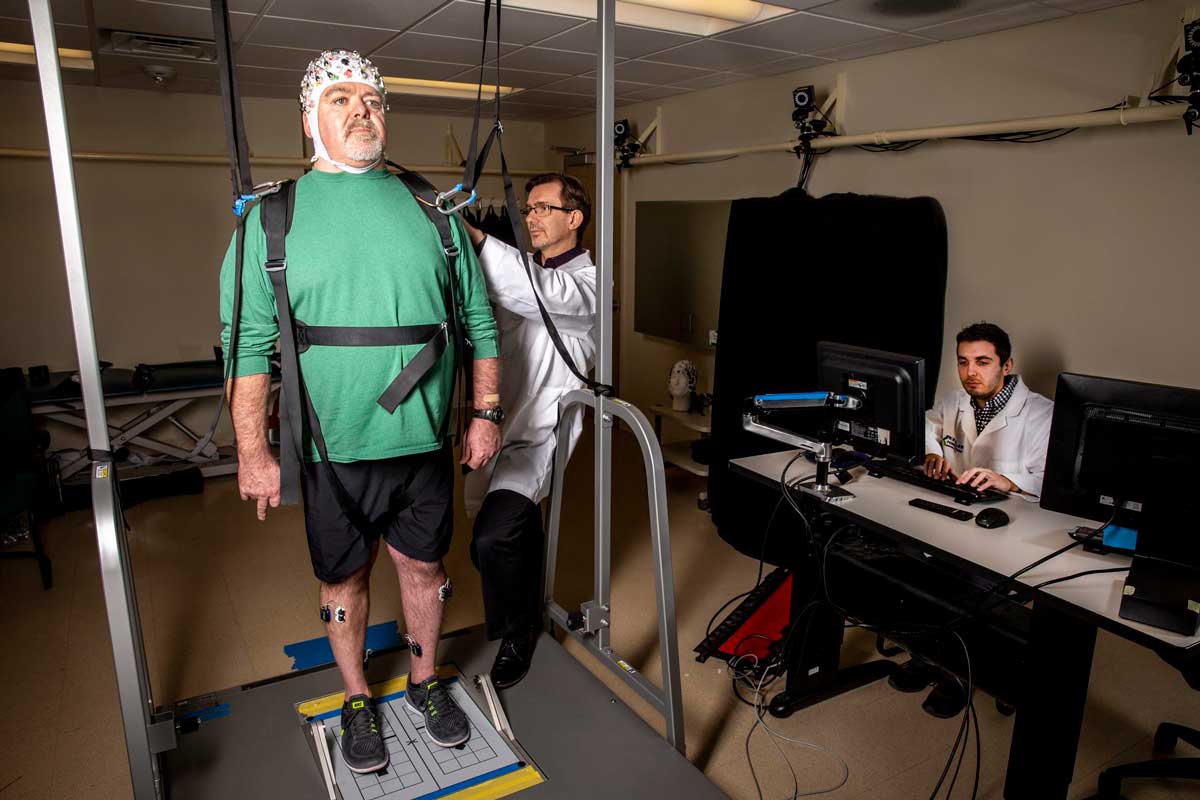Pilot study explores neural mechanisms of balance dysfunction after traumatic brain injury
Kessler Foundation researchers examine graph-theoretical properties of brain networks in traumatic brain injury and controlsand their association with balance impairment and structural damage

A study session being conducted in Dr. Allexandre’s laboratory at Kessler Foundation. A participant on the computerized balance platform wearing a specialized EEG device is prepared for the study by Dr. Allexandre.
East Hanover, NJ. October 20, 2021. Using neuroimaging techniques and electroencephalography (EEG), Kessler Foundation researchers compared the neural correlates of balance in individuals with traumatic brain injury and matched controls. This study is the first to report EEG-based functional connectivity measures during a balance perturbation task and show the association with white matter integrity in the brain.
The article, "Graph-theoretical analysis of EEG functional connectivity during balance perturbation in traumatic brain injury: A pilot study" (doi: 10.1002/hbm.25554), was published online on July 26, 2021 by Human Brain Mapping. It is available open access at: https://www.ncbi.nlm.nih.gov/pmc/articles/PMC8410544/. The authors are Vikram Shenoy Handiru, PhD, Alaleh Alivar, PhD, Armand Hoxha, MS, Soha Saleh, PhD, Easter S. Suviseshamuthu, PhD, Guang Yue, PhD, and Didier Allexandre, PhD, from the Center for Mobility and Rehabilitation Engineering Research at Kessler Foundation.
Postural instability is an understudied complication of traumatic brain injury that hinders progress in rehabilitation, limits independence, and compromises safety. Despite the impact on the daily lives of individuals and their care partners, little research has been done on the neural mechanisms that contribute to balance function.
For this pilot study, researchers in Dr. Allexandre’s Neuromuscular and Electrophysiology Laboratory studied 17 adults with traumatic brain injury and 15 matched controls. Using a computerized posturography platform and EEG, scientists delivered random balance perturbations and measured each participant’s neural and postural responses. Furthermore, a subset of participants had magnetic resonance imaging (MRI) performed at the Rocco Ortenzio Center for Neuroimaging at Kessler Foundation, to measure brain structural integrity using diffusion tensor imaging (DTI).
DTI studies showed widespread structural damage in the traumatic brain injury group, which had poorer balance performance and reduced brain activity and connectivity during balance tasks. The graph-theoretic measures of brain functional connectivity derived from EEG data show an abnormal brain network response during the balance task, an intriguing finding that warrants further investigation.
“Using EEG-based graph measures, we were able to explore the differences in underlying structural and functional mechanisms in individuals with and without traumatic brain injury, which may lead to the identification of a neural biomarker for balance dysfunction,” said lead author Dr. Shenoy Handiru. “Future investigations need to look at how to modulate brain networks affected by brain injury. We hypothesize that postural training may be a way to ‘re-wire’ damaged networks so their function mimics that of the healthy brain, and lead to the desired outcome of improved balance function.”
Funding sources: New Jersey Commission on Brain Injury Research CBIR15MIG004
About Kessler Foundation
Kessler Foundation, a major nonprofit organization in the field of disability, is a global leader in rehabilitation research that seeks to improve cognition, mobility, and long-term outcomes, including employment, for people with neurological disabilities caused by diseases and injuries of the brain and spinal cord. Kessler Foundation leads the nation in funding innovative programs that expand opportunities for employment for people with disabilities.